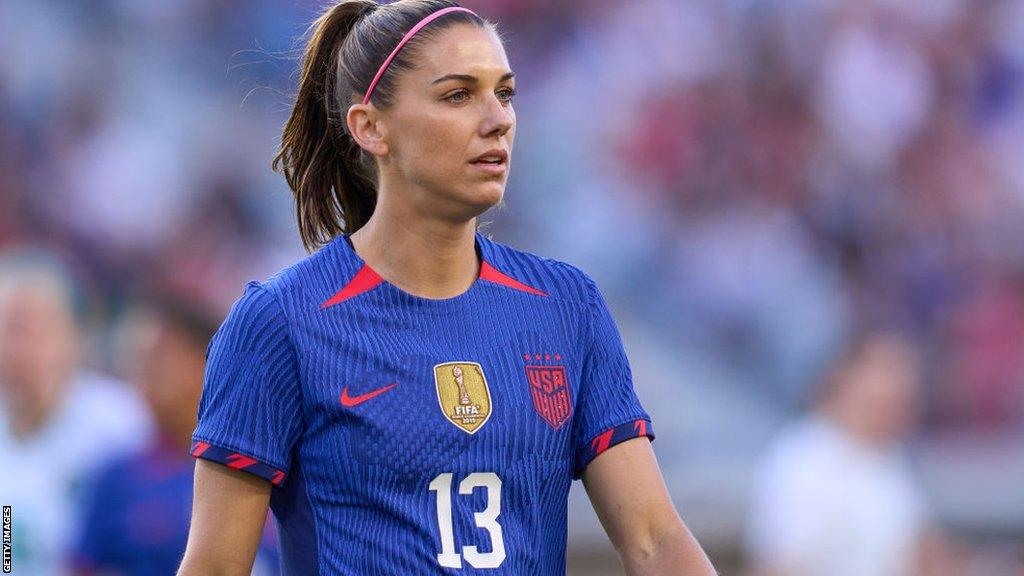Alex Morgan: USA in 'different space' for World Cup because of growth in equality
- Published

Alex Morgan is heading to her fourth World Cup this summer with the USA
Alex Morgan says the United States are in a "different space" going into this year's Women's World Cup because of improvements in equality, but other countries are still fighting for it.
Before the USA won their second successive World Cup in 2019, players filed a discrimination lawsuit against US Soccer regarding equal pay.
They reached an agreement in 2022 which Morgan said was a "historic" moment.
"It's not just us, there are a lot of teams still fighting it," said Morgan.
"Our team is in a way different space than we were going into the 2019 World Cup having achieved equal pay, equal prize money and equal working conditions.
"But you look at Spain and there are some players who should absolutely be at this World Cup that are not going due to the inequalities of their team."
Last year the Spanish Football Federation (RFEF) claimed 15 members of its national team had said they would resign unless head coach Jorge Vilda stepped down.
That was later denied by the players, who had been told they would not be selected for international duty unless they apologised.
Just three of the 15 players were selected for the World Cup, with notable absentees including Barcelona's Champions League winners Mapi Leon, Patri Guijarro, Claudia Pina and Sandra Panos.
Last week, Jamaica players expressed their "utmost disappointment" in the "subpar" support from the country's football federation.
On Tuesday, Fifpro, the world players' union, said many players in Women's World Cup qualifying had to endure poor pitches and did not receive proper medical checks.
However, Morgan believes this summer's World Cup in Australia and New Zealand, which kicks off on 20 July, will be a "testament to the growth" that has been achieved in many parts of the game.
"I think this World Cup is going to be the most watched, the most attended and bring in the most revenue than we have ever seen," added Morgan.
"You are starting to see Fifa respect that and value women's soccer way more than we have seen previously, so I think that puts pressure on sponsors, federations and everybody in the soccer world to embrace it.
"This World Cup is just going to be another testament to the growth of women's soccer and hopefully we can put on a great show."
Nations will receive increased prize money at this year's World Cup, with the winning country set to gain £3.4m as well as players each receiving individual payments, external ranging from £23,500 if they are knocked out in the group stages to £211,000 if they win.
The total payment package from Fifa equates to £119m - which remains much lower than the men, who received £344m in 2022 - but is three times higher than the 2019 Women's World Cup.
Fifa also announced equal conditions and services will be provided in Australia and New Zealand, as they were in Qatar.
The BBC and ITV agreed a deal to broadcast the tournament in the UK, five weeks before it begins, after Fifa president Gianni Infantino had threatened a European TV blackout if rights offers were not improved.
"The increase in competition in the leagues around the world is creating more parity in the international game," added Morgan.
"You look at England, France and leagues in Mexico and Sweden - there are so many leagues around the world that are paying players more, that are playing more often throughout the season and are treating players in a professional way that we have been fighting for for a long time.
"For so many decades women were not allowed to play sport or soccer in so many countries, so we have a lot of catching up to do. I think that's happening at such an accelerated rate.
"The National Women's Soccer League [NWSL] has really helped with that, and our fight with the national team for equal pay has also really brought to attention where the sport is right now, where it needs to be and how we can get there.
"I'm really proud of being on this national team to fight for that. Not only for ourselves, but for the future of this sport both in the US and globally."

Is it a good idea to fix your mortgage and energy bills? Martin Lewis explains...
Can a man ever beat a horse in a race? Every year since 1980, a small town in Wales has been trying to find out
